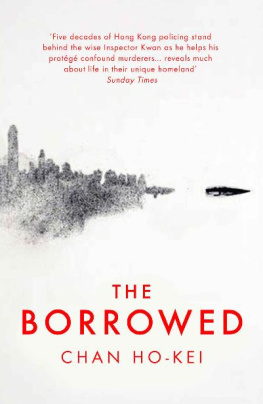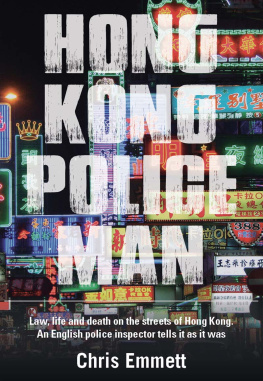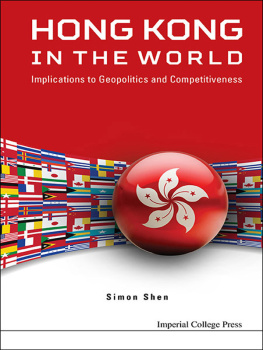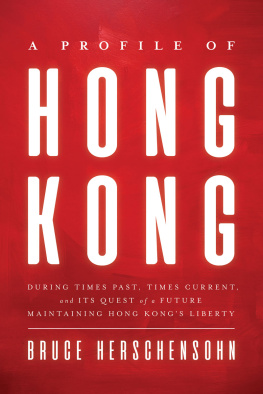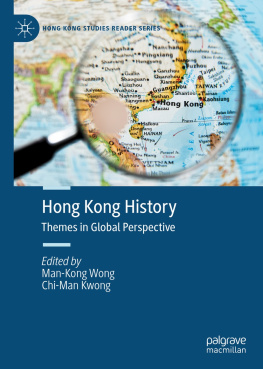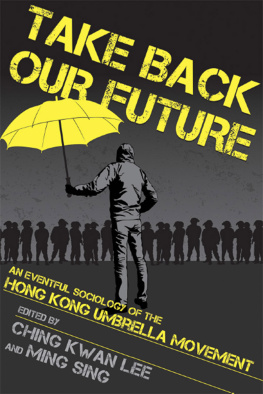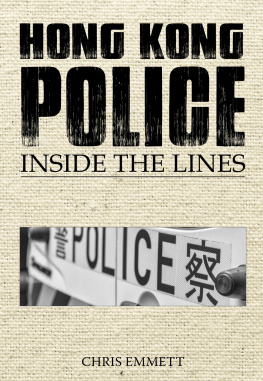THE BORROWED
Chan Ho-Kei
Translated by Jeremy Tiang
www.headofzeus.com

SIX INTERLOCKING STORIES .
ONE SPELLBINDING NOVEL .
The year is 2013, and Inspector Kwan, Hong Kongs greatest detective, is dying. His partner Detective Lok has come to his deathbed, to seek help from his mentor with one final case.
Then we move backwards into their past, through six different but interlocking murder cases solved by Kwan and Lok in fifty years on the Hong Kong force.
Where there is murder, there is humanity. This bold and intricate crime novel spans five decades of love, honour, race, class, jealousy and revenge, set against the shifting landscape of one of the most intriguing nations in the world.
Contents
I will well and faithfully serve Her Majesty and Her Heirs and Successors according to law as a police officer, I will obey, uphold and maintain the laws of the Colony of Hong Kong, I will execute the powers and duties of my office honestly, faithfully and diligently without fear of or favour to any person and with malice or ill will towards none, and I will obey without question all lawful orders of those set in authority over me.
HONG KONG POLICE OATH ,
version used until 1980

THE TRUTH BETWEEN BLACK AND WHITE:
2013
1
I NSPECTOR L OK HAD always hated the stench of hospitals.
That antiseptic tang was wafting through the air now, assaulting his nose. It wasnt that he had bad memories of these places, but the reek reminded him too much of a morgue. Hed been on the police force twenty-seven years and seen countless corpses, yet still couldnt get used to this smell but then who, necrophiliacs aside, gets a thrill out of dead bodies?
Lok sighed, his heart even heavier than when he had to oversee an autopsy.
Standing by in his neat blue suit, he gazed disconsolately at the occupant of the lone bed, a white-haired man whose eyes were shut, his wrinkled face ghastly pale beneath a respirator mask. Fine tubes pierced his liver-spotted hands, connecting them to several monitoring devices. A seventeen-inch screen above the bed showed the patients vital signs, lines wavering slowly from left to right the only thing showing he was still alive, not a well-preserved corpse.
This was Inspector Loks mentor of many years, the man whod taught him everything he knew about crime solving.
Sonny, let me tell you you dont solve cases by meekly following the rules. Sure, among the uniforms, obeying orders is an ironclad principle, but as officers our first duty is to protect civilians. If the rules cause an innocent citizen to get hurt or impede the course of justice, thats ample reason to disregard them.
Lok smiled grimly as he recalled these words, variations of which were never far from the older mans lips. Since his promotion fourteen years ago, everyone had called him Inspector Lok, but his mentor continued to use that ridiculous little-boy name, Sonny. After all, as far as he was concerned, Lok really was no more than a child.
Before his retirement, Superintendent Kwan Chun-dok had been Commander of the Central Intelligence Bureaus Division B. The CIB was the agency in charge of researching, gathering, and analysing crime reports from the various regional bureaus. If the CIB were the brain of the police force, then Division B would be its prefrontal lobe, the part responsible for deduction, sifting and sorting information, pulling together clues to reveal what even eyewitnesses might not have noticed. Kwan had begun leading this core group in 1989 and had quickly become the guiding spirit of Intelligence. In 1997, Constable Sonny Lok had been transferred to Division B, becoming Kwans disciple. Although Kwan was only Loks commanding officer for half a year, he continued working as a police consultant after retirement, which gave him more opportunities to guide Sonny, twenty-two years his junior. For the childless Kwan, it felt like having a son.
Sonny, waging psychological war against a suspect is like playing poker you have to mislead them about your hand. Say youre holding a pair of aces, you have to make them think you have low cards of different suits; but the worse things get, the harder you bluff, making them think victory is within your grasp. Thats how you get them to give themselves away. Like a father instructing his child, Kwan passed on every one of his tricks.
After many years together, Lok treated Kwan like his father, and knew his personality inside out. While others referred to Kwan as Sir, Lok called him Sifu, which meant mentor in Cantonese. His colleagues in the force gave Kwan all kinds of nicknames: Crime-Solving Machine, Eye of Heaven or Genius Detective. Lok thought the most suitable was something Kwans late wife once said: Hes basically the sort to count every strand of dead grass. You might as well call him Uncle Dok.
In Cantonese, Uncle Dok is a common name for the tightest of tightwads. It also happened to share the last syllable of Kwans own name. Thinking of this pun from so many years back, Lok couldnt help smiling.
Scarily capable, fiercely independent, obsessively attentive to every detail this was the oddball character whod lived through the leftist unrest of the sixties, the police mutiny of the seven-ties, the violent crime of the eighties, the transfer of sovereignty in the nineties, the social changes in this new millennium. Across all these decades, hed quietly solved hundreds of cases, silently filling a glorious page of the history of Hong Kong policing.
And now this legendary figure had one foot in the grave. The gleaming image of the police force hed built up had started to fade, and by now, in 2013, the profession was looking distinctly tarnished.
After ridding themselves of corruption in the seventies, the Hong Kong Police had earned the reputation of a selfless, reliable organization. There might have been the occasional black sheep, but the vast majority of the populace were able to see these as exceptions What changed this view was politics. In 1997, after the territory was handed over from Britain to China, a society that had once been able to contain different value systems began to be torn apart into political factions. Rallies and protests became more heated, and the use of hardline tactics against protesters provoked murmurs about where the police really stood. The police were supposed to be neutral, but when the clashes impinged upon government institutions they seemed to hold back rather than performing with their usual superb efficiency. People started insinuating that in Hong Kong, power was now able to crush justice, and that the police were just the stooges of those in authority, closing one eye when it came to groups supported by the government, serving no one but the politicians.
In the past, Inspector Lok had refuted such criticisms. Now, though, he was starting to suspect they might hold some truth. More and more of his colleagues seemed to regard their position as just a job, rather than a sacred calling, and did nothing but follow orders, the same as any other salaried worker.
Now and then, hed hear the refrain, The more you do, the more mistakes you make, so better do less. When he joined the force, back in 1985, he had been motivated by a longing for the status of a police officer the duty to keep the peace and uphold justice. These new officers seemed to regard ideas like justice purely theoretically. Their goals were to maintain a good discipline record, rise through the ranks as quickly as possible, safely reach retirement and start drawing on their generous pensions. And as the public began to notice the growing prevalence of this mindset, they thought less and less of the police.

